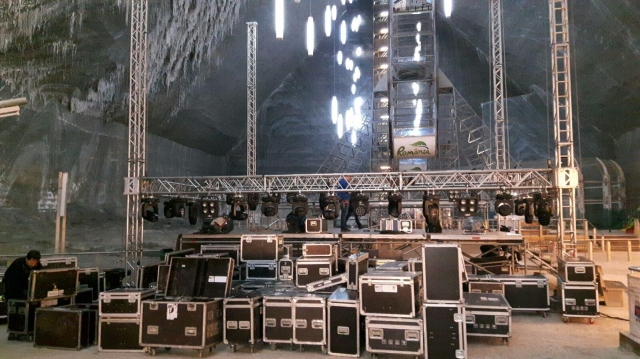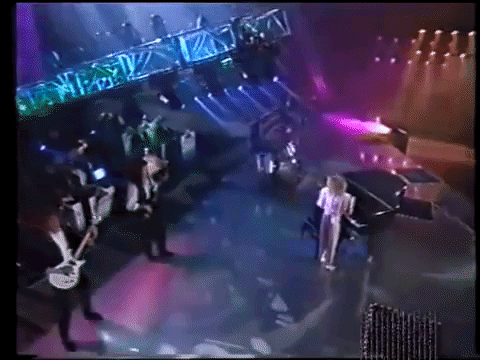
When ESC stands for Eurovision Salt Contest

When ESC stands for Eurovision Salt Contest
While we’ve never seen a venue quite like it before, you might be surprised to learn that the subject of salt is one that has been known to occupy Eurovision’s songwriters over the years.
The most obvious place to start is in 1966, where the Belgian entry, Tonia‘s “Un peu de poivre, un peu de sel”, describes the love potion prescribed to the singer when she consults the local sorceress for tips on how to get the boy she’s been chasing. (Because obviously.) The ingredients to the magic brew include honey and super-strength brandy, but it’s the seasoning that plays the starring role:
The United Kingdom’s entry from 2007, “Flying The Flag (For You)” by Scooch, was one that divided opinions among fans (although the voters everywhere except Malta and Ireland were fairly clear on the matter). Whatever you think of the song, among its most memorable moments were the asides from aggressively camp cabin crew member David Ducasse. All together now: “Some salted nuts, sir?”
Legendary Portuguese lyricist Rosa Lobato de Faria was always one for listing lots of foodstuffs, but somehow her ESC entries never paid much attention to condiments. Fortunately, José Fanha came to the rescue in 1996 with a lyric that allowed Lúcia Moniz to eulogise her “language of honey and salt” in the very first line:
In 2010, Jessy Matador got straight to the point, inviting us to “dance closely for a salty kiss”. And who are we to refuse?
At the other end of the emotional scale, in 2008 Jelena Tomašević was so pissed off at her lover being hacked to bits at the Battle of Kosovo that she told us there was no point in putting salt on her wounds because she had no tears left to cry anyway. The poor dear.
The Italian entry from 1984, “I treni di Tozeur”, even explicitly mentions a salt mine in its lyrics. We hope that means it might be covered by one of the interval acts in Turda – but if nothing else, it gives us the opportunity to share this perfectly out-of-place performance by Alice and Franco Battiato from Dutch TV:
Those are just a few examples of the salt peppering the pages of the the ESC history books – and that’s before we even turn our attention to the wacky world of the preselections.
Memorable non-winning national finalists to summon the saline gods include Estonian repeat offender Kate, whose string of attempts to reach the international stage included 1999’s “Saga of Water and Salt”:
Meanwhile, progressive rockers Pain Of Salvation slowed it right down with their 2010 Melodifestivalen effort “Road Salt”:
And you could scarcely ask for a more Eesti Laul combination than a song called “Salty Wounds” by an artist called Windy Beach:
So as you can see, salt truly does have its place in our beloved contest!
However, we should also note that salt mines are known for triggering unfortunate reactions in some people, including dizziness – so we hope for the contestants’ sake that there won’t be any “Duett moments” on Sunday night.

Visit our Eurovision Chat!
0 Comments
Visit our Eurovision Chat!
Follow us:
Shkodra Elektronike from Albania are the winners of ChatVote 2025!
The 21st annual edition of ChatVote is over, and the best song in the forthcoming Eurovision Song Contest is the entry from… Albania!
SongHunt 2025: Detailed results
Time to reveal the full results of SongHunt 2025, including the top ranks of the semi-finals and the split results of the final!
ChatVote 2025 is launched – the voting lines are open!
It’s time for the 21st edition of our legendary annual event. For our chat regulars, the lines are now open for you to submit your votes!
“This Dream Of Mine” by Arwin is the winner of SongHunt 2025!
Our chat community and the public have decided: “This Dream Of Mine” by Arwin from Sweden is the most ROBBED song of the 2025 Eurovision national final season!
ESC 2025: Semi-final running orders revealed!
Who’ll be singing where in which semi-final? It’s the big question – and the official Eurovision YouTube account revealed all this evening!
SongHunt 2025 – Semi-final 3
The SongHunt continues! Semi-final 3 is open and YOUR votes will help to decide who qualifies, so get involved!
SongHunt 2025 – Semi-final 2
The SongHunt continues! Semi-final 2 is open and YOUR votes will help to decide who qualifies, so get involved!
SongHunt 2025 – Semi-final 1
Let the SongHunt begin! Semi-final 1 is open and YOUR votes will help to decide who qualifies, so get involved!
SongHunt 2025 is launched!
It’s time for SongHunt 2025! The public polls and chat events are nearly upon us, and there are some changes you’ll want to know about – so read all about it here and save the dates in your calendars!
Potted Basel: Allocation draw for 2025 takes place
Today saw the allocation draw for the 2025 Eurovision Song Contest to be held in Basel, Switzerland. Here’s how the countries will line up in the two semi-finals!
Shkodra Elektronike from Albania are the winners of ChatVote 2025!
The 21st annual edition of ChatVote is over, and the best song in the forthcoming Eurovision Song Contest is the entry from… Albania!
SongHunt 2025: Detailed results
Time to reveal the full results of SongHunt 2025, including the top ranks of the semi-finals and the split results of the final!
ChatVote 2025 is launched – the voting lines are open!
It’s time for the 21st edition of our legendary annual event. For our chat regulars, the lines are now open for you to submit your votes!
“This Dream Of Mine” by Arwin is the winner of SongHunt 2025!
Our chat community and the public have decided: “This Dream Of Mine” by Arwin from Sweden is the most ROBBED song of the 2025 Eurovision national final season!
escgo! on Twitter






0 Comments